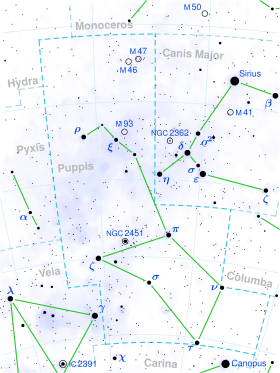HD 68601 is a class A7Ib[3] (white supergiant) star in the constellation Puppis. Its apparent magnitude is 4.75[2] and it is approximately 4,200 light years away based on parallax.[1]
| Observation data Epoch J2000 Equinox J2000 | |
|---|---|
| Constellation | Puppis |
| Right ascension | 08h 11m 25.89174s[1] |
| Declination | −42° 59′ 14.1988″[1] |
| Apparent magnitude (V) | 4.75[2] |
| Characteristics | |
| Spectral type | A7 Ib[3] |
| U−B color index | +0.07[2] |
| B−V color index | +0.18[2] |
| Astrometry | |
| Radial velocity (Rv) | +19.20[4] km/s |
| Proper motion (μ) | RA: -6.37[1] mas/yr Dec.: +4.64[1] mas/yr |
| Parallax (π) | 0.78 ± 0.14 mas[1] |
| Distance | approx. 4,200 ly (approx. 1,300 pc) |
| Absolute magnitude (MV) | -5.73[5] |
| Details | |
| Mass | 1.6[3] M☉ |
| Luminosity | 16,310[5] L☉ |
| Temperature | 7,220[6] K |
| Rotational velocity (v sin i) | 0[7] km/s |
| Other designations | |
| Database references | |
| SIMBAD | data |
It has one companion, B, with magnitude 9.81 and separation 26.4".[8]
References edit
- ^ a b c d e f Van Leeuwen, F. (2007). "Validation of the new Hipparcos reduction". Astronomy and Astrophysics. 474 (2): 653–664. arXiv:0708.1752. Bibcode:2007A&A...474..653V. doi:10.1051/0004-6361:20078357. S2CID 18759600. Vizier catalog entry
- ^ a b c d Ducati, J. R. (2002). "VizieR Online Data Catalog: Catalogue of Stellar Photometry in Johnson's 11-color system". CDS/ADC Collection of Electronic Catalogues. 2237. Bibcode:2002yCat.2237....0D.
- ^ a b c Tetzlaff, N.; Neuhäuser, R.; Hohle, M. M. (2011). "A catalogue of young runaway Hipparcos stars within 3 kpc from the Sun". Monthly Notices of the Royal Astronomical Society. 410 (1): 190–200. arXiv:1007.4883. Bibcode:2011MNRAS.410..190T. doi:10.1111/j.1365-2966.2010.17434.x. S2CID 118629873. Vizier catalog entry
- ^ Gontcharov, G. A. (2006). "Pulkovo Compilation of Radial Velocities for 35 495 Hipparcos stars in a common system". Astronomy Letters. 32 (11): 759–771. arXiv:1606.08053. Bibcode:2006AstL...32..759G. doi:10.1134/S1063773706110065. S2CID 119231169.
- ^ a b Anderson, E.; Francis, Ch. (2012). "XHIP: An extended hipparcos compilation". Astronomy Letters. 38 (5): 331. arXiv:1108.4971. Bibcode:2012AstL...38..331A. doi:10.1134/S1063773712050015. S2CID 119257644. Vizier catalog entry
- ^ McDonald, I.; Zijlstra, A. A.; Boyer, M. L. (2012). "Fundamental parameters and infrared excesses of Hipparcos stars". Monthly Notices of the Royal Astronomical Society. 427 (1): 343–357. arXiv:1208.2037. Bibcode:2012MNRAS.427..343M. doi:10.1111/j.1365-2966.2012.21873.x. S2CID 118665352. Vizier catalog entry
- ^ Hoffleit, D.; Warren, W. H. (1995). "VizieR Online Data Catalog: Bright Star Catalogue, 5th Revised Ed. (Hoffleit+, 1991)". VizieR On-line Data Catalog: V/50. Originally Published in: 1964BS....C......0H. 5050. Bibcode:1995yCat.5050....0H.
- ^ Mason, Brian D.; Wycoff, Gary L.; Hartkopf, William I.; Douglass, Geoffrey G.; Worley, Charles E. (2001). "The 2001 US Naval Observatory Double Star CD-ROM. I. The Washington Double Star Catalog". The Astronomical Journal. 122 (6): 3466. Bibcode:2001AJ....122.3466M. doi:10.1086/323920. Vizier catalog entry
